Everything You Need to Know About Aerial Yoga
What is Aerial Yoga?
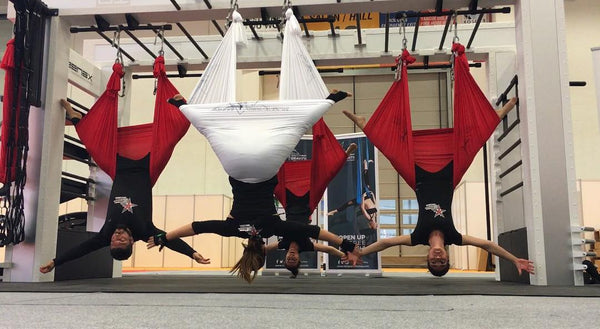
Aerial Yoga is a hybrid yoga practice which combines traditional Hatha Yoga poses, aerial acrobatic arts and body conditioning exercises performed with the aid of an aerial hammock. Classes can range from gentle and restorative to very demanding depending on how the hammock is used, making it suitable for people of all levels of experience and physical ability.
Aerial Yoga Benefits
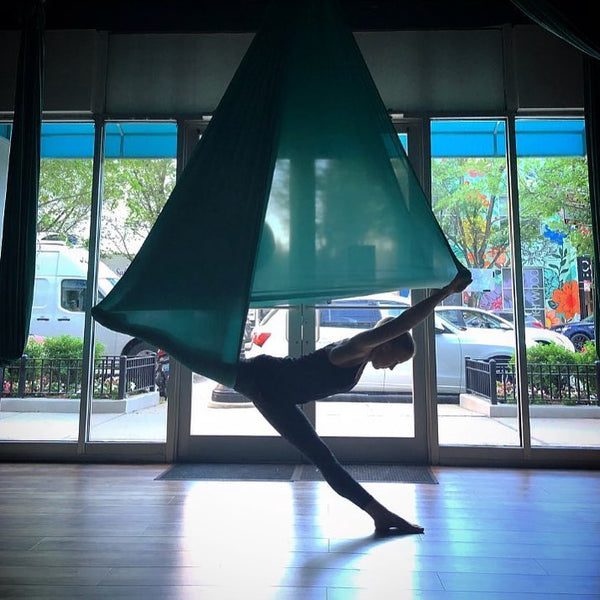
Aerial Yoga has all the same benefits of regular yoga with some added extras, including:
Decompression and alignment of the spine
Strengthening and lengthening of the body
Upper body strengthening
Core strengthening
Improved balance
Body awareness
Increased spacial intelligence
Relieving stress and anxiety.
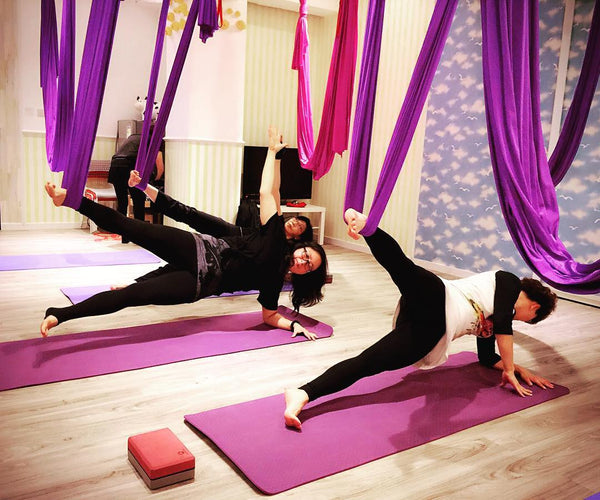
(Image via @nirvanayogavihara)
Using an aerial hammock makes inversions obtainable to everyone regardless of experience or physical condition. Our bodies get better oxygenation through increased blood flow to the brain during inversions which have many health and anti-ageing benefits such as:
Improved digestion and elimination
Improved blood circulation
Improved lymphatic drainage
Improved skin tone
Relief of spinal pain
Helps with insomnia
Energises the body and mind.
Aerial Yoga also helps to build confidence and self-esteem. “I’ve noticed most Aerial beginners are under the impression they can’t or won’t be able to perform the inversions or acrobatics in the class,” Melina tells us. “I have seen the look of pure joy on my students’ faces when they overcome their fear and try and actually accomplish it… sometimes they even tear up – as do I; it’s really an amazing experience for both the student and the teacher.”
How Does The Aerial Yoga Hammock Work?
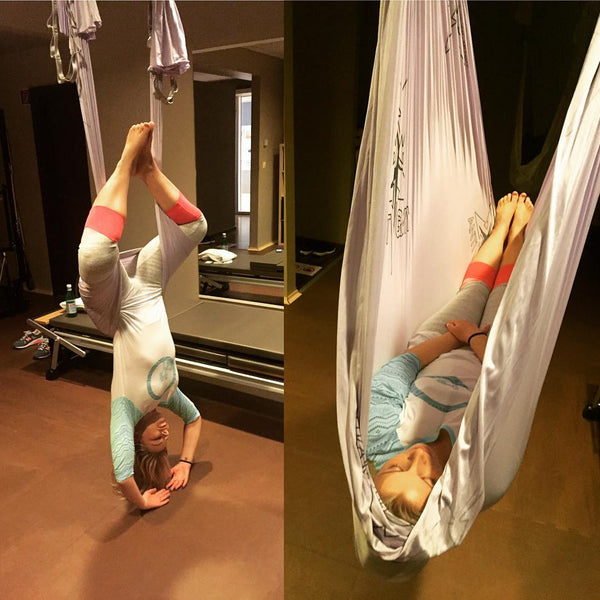
(Image via @caro_msk)
The Aerial Yoga Hammock is made from a specific type of synthetic fabric, that is both soft and durable. The Hammock is hung from the ceiling, ending close to the floor which enables you to aid or add difficulty to certain yoga poses, while also being able to explore acrobatic movement in the air.
Differences between a Hammock, Aerial Yoga Swing and Frame
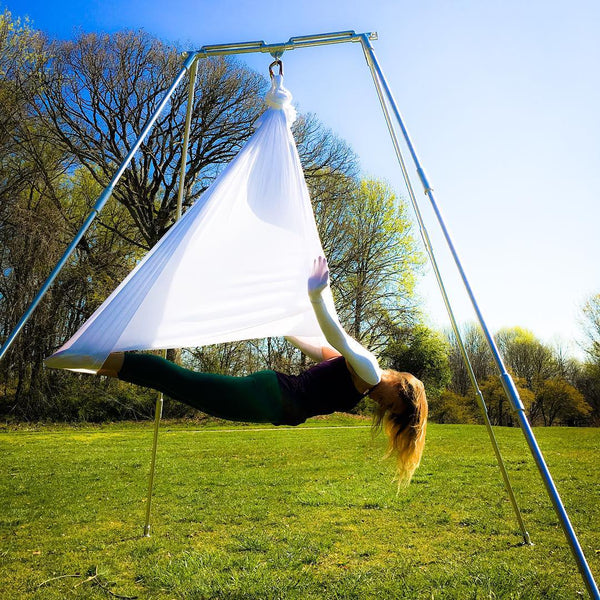
There is a big difference between Aerial Yoga and Swing. First of all the swing was originally designed just as a product along with a users guide which one could use on their own to aid in certain stretches/strengthening exercises and inversions. Aerial Yoga is a whole yoga practice adapted to the use of the hammock, taught by certified yoga teachers. The fabrics are also completely different; Aerial yoga hammocks are made of a soft, slightly stretchy fabric which is at least 6 meters long and 2 meters wide.
The Swing has handles on it and is made out of parachute material which has no stretch and is much shorter, limiting the range of movements one is able to explore. You can not step on the swing or fully get into it as you can with the Aerial Hammock.
The frame is a metal frame that you can buy and set up at your house to hang the Aerial hammock or swing from if you don’t want to (or can’t) hang it from the ceiling. There is also the handy doorway frame, that doesn’t need screws; it just wedges in your door frame!
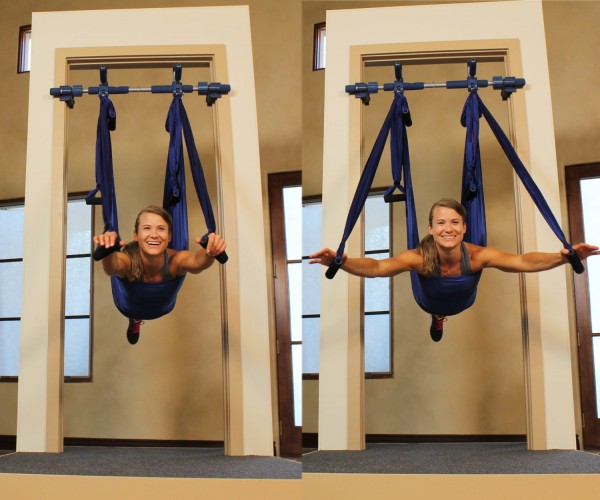
Other Aerial Yoga Equipment
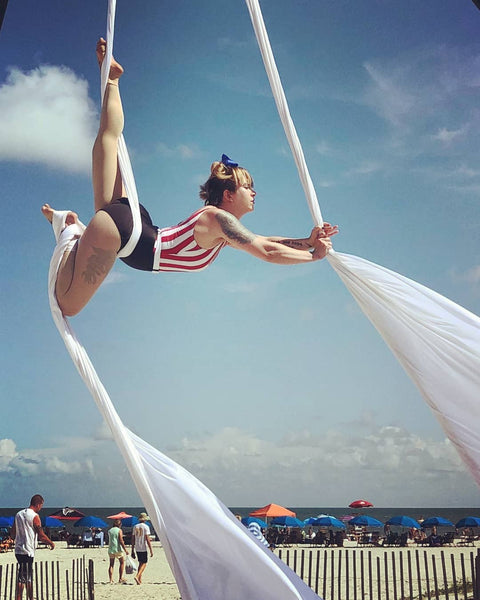
(Image via @aerialkathleen)
There is also another type of aerial exercise called “Aerial Silks” which are a long fabric hung from a very high ceiling. This is more of a dance/acrobatic performance, not yoga. And there are also aerial hoops, which is a hula hoop suspended from the ceiling where you again would perform circus-like acrobatics.
Aerial Yoga At Home
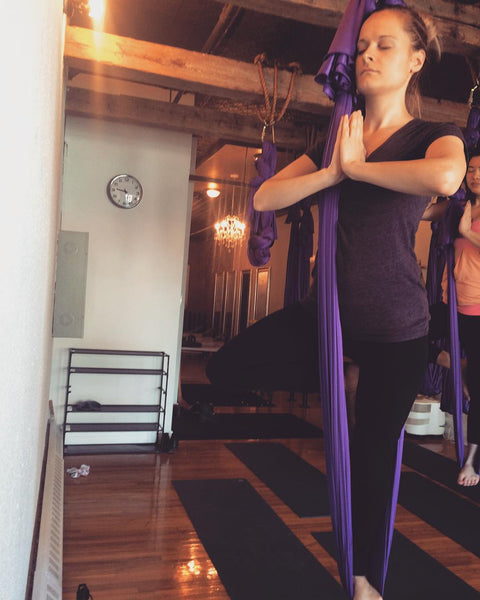
If someone wants to do Aerial Yoga at home, we would first recommend they are very familiar with the aerial hammocks and how to safely use them. Taking classes with a certified teacher is a must in order to learn the practice. It’s also best if they are a confident solo yoga practitioner. If you do go the at-home route and buy your own hammock, the ceilings have to be at least 2.70 in height and there should be around 1.5 meters of free space in front and behind and either side of the exercise area, in order to be able to explore the full range of movements safely with the hammock.
10 Aerial Yoga Poses
There are so many Aerial Yoga poses, almost as many as there are regular yoga poses, and we teamed up with Melina and got her to show us 10 of her favourites.
1. Wing Span Shoulder Stretch
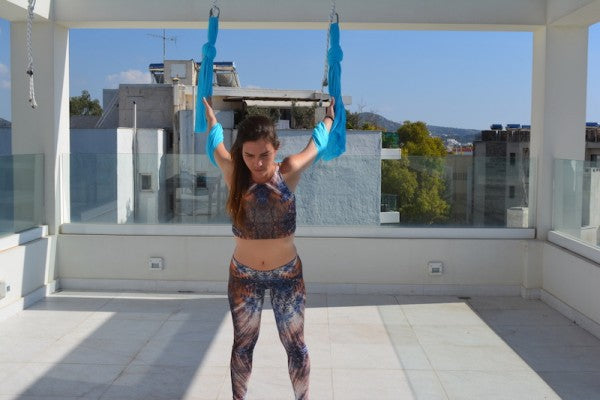
Stand in front of hammock
Place shoulders through the hammock and wrap hands around it
With the arms wide above eye level, lean forward and enjoy the stretch!
2. Downward Facing Dog
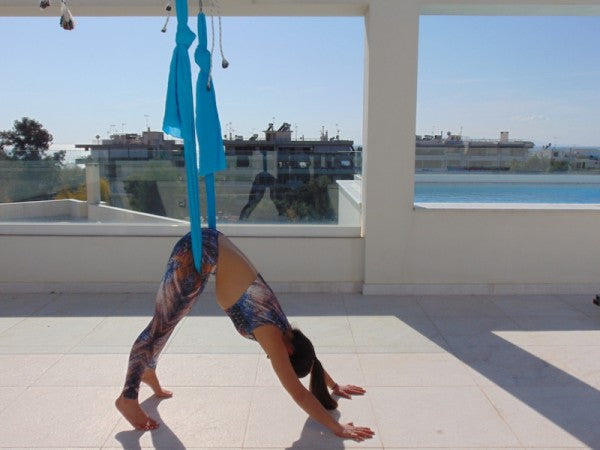
Hold the fabric wider than the hips and place it on the hip crease
Bending from the hips, lean the chest down to secure the hammock in place
Walk yourself forward until your heels are touching the floor (or almost)
Stretch arms forward and place on the ground.
3. Chaturanga Dandasana or Full Plank
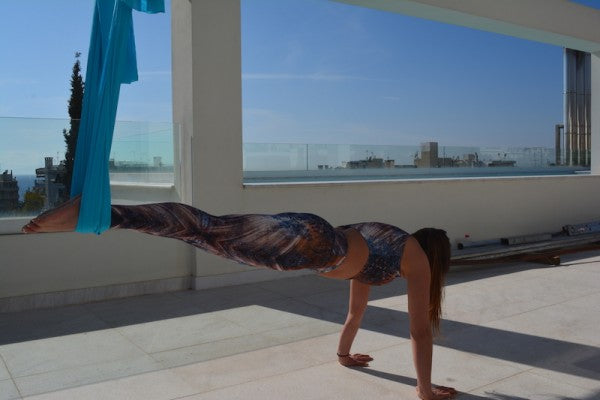
Place both feet in the hammock
Hands are placed under the shoulders
Keep the hips at shoulder height
Engage your core to keep the lower back full.
4. Warrior II
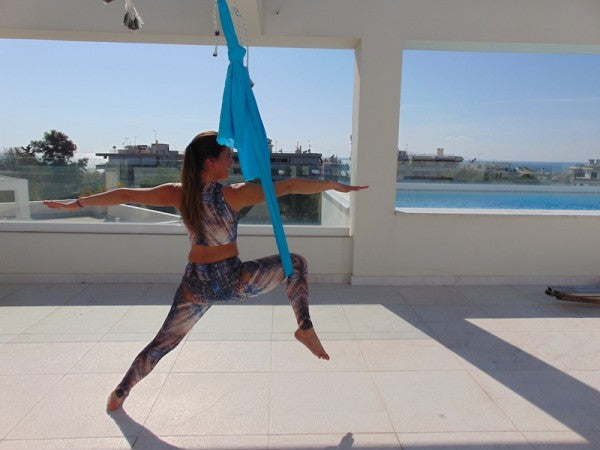
Bring the fabric behind one knee
Open the body to the side while keeping a strong back leg
Push front leg into fabric
Lift arms up to shoulder height and extend away from body
Lean weight slightly forward until you come into the position.
5. Warrior III
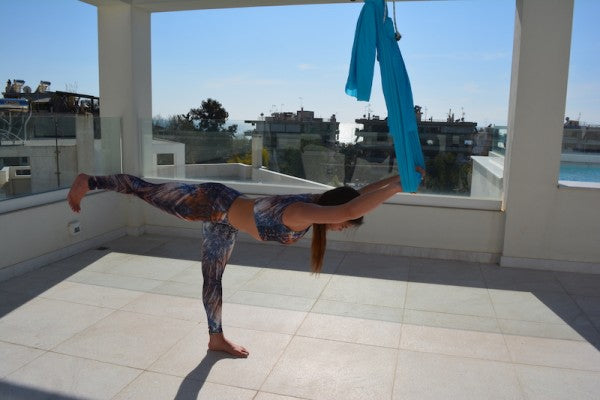
Stand with feet hip-width apart
Grab the fabric shoulder-width apart
Push outer edges of hands down to keep wrists level
Bend from the hips lowering torso parallel to the floor
Lift one leg and extend back bringing it parallel to floor
Keep abdomen engaged and tailbone lengthening towards the heels.
6. Padangushtasana
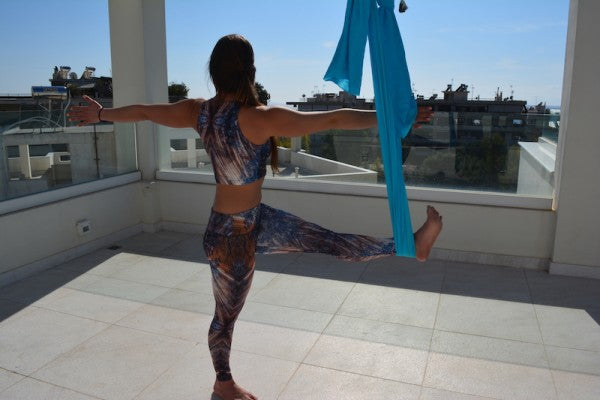
Standing firmly on one leg, place the other leg into hammock behind the ankle
Lengthen the spine and twist toward the side of the lifted leg
Extend the arm on that same side out behind you
Push the opposite arm on to the outer side of the fabric.
7. Inverted Backbend
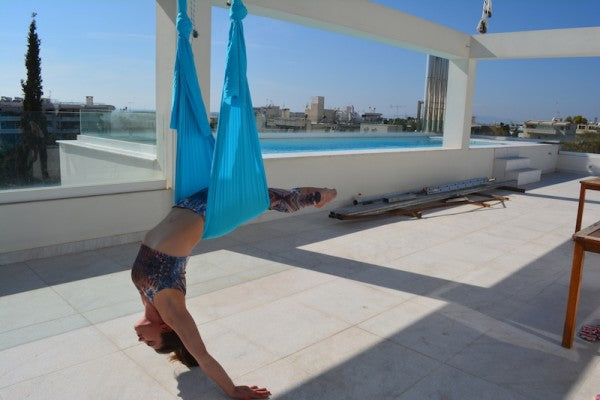
Stand in front of hammock
Gather 1/3 of the fabric into hands and turn to have hammock behind you
Place elbows in hammock and with hands push the hammock down so you can sit
Grab fabric with fingers facing out and gather at the sacrum
Start lowering the torso backwards while sliding the hands further up the fabric
If you feel comfortable, you can let go of fabric and extend the arms to the floor.
8. Hanging Bow Pose
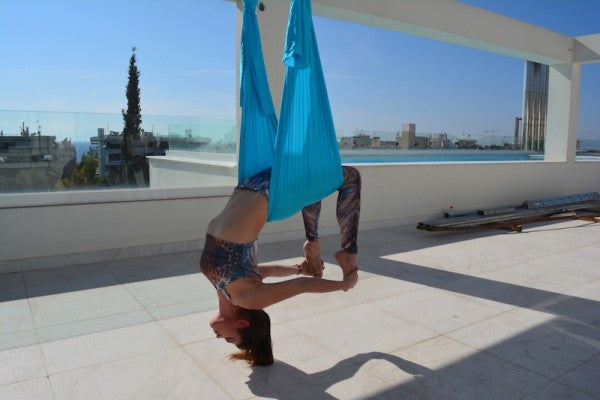
Follow the same instructions to enter into Inverted Backbend
Then Bend the knees and grab hold of the feet/ankles.
9. Baddha Konasana (Cobblers Pose or Aerial Bound Angle)
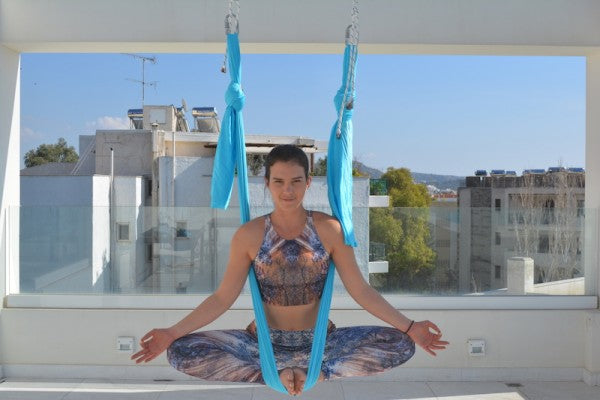
Stand in the hammock with both feet
Keeping hands extended at shoulder height, start lowering your hips until you form a right angle with your body
Bring the knees out to the side and bring the soles of your feet together
Bend the knees and bring the groin to rest against the fabric
Lower your hips until your feet are pointing forward
Bring your shoulders in front of the hammock and rest hands on the knees.
10. Savasana

Gather 1/3 of the hammock’s length in your hands and sit in the hammock
Lie down in the hammock bringing your whole body inside of it
Relax the whole body releasing your weight into the hammock and enjoy!
[……]

